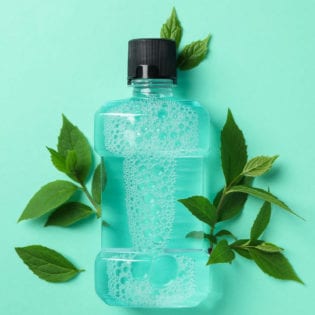To Mouthwash, or Not to Mouthwash: That is the Question
Posted by nmcclees
We all know that brushing and flossing are the building blocks of a good oral hygiene routine. Should you use a mouthwash too? After all, who doesn’t love that minty freshness that comes from that daily swish? What are the benefits and drawbacks? We’ll address these questions and more – keep reading!
How Does Mouthwash Work?
Mouthwash, or an oral rinse, usually contains antiseptic ingredients such as alcohol, menthol, and eucalyptol. These ingredients kill harmful bacteria that can live between your teeth, on your tongue, and in hard-to-reach places in your mouth helping to fight against bad breath and tooth decay.
While mouthwash doesn’t replace brushing your teeth or flossing in terms of oral hygiene, it can be effective when used properly. The ingredients in each mouthwash formula vary slightly by manufacturer, and different products are intended for different purposes. For example, some oral rinses can help to make your tooth enamel stronger by including fluoride. These fluoride additives coat your teeth and absorb into your tooth enamel which helps to make the teeth more durable and resistant to plaque and decay.
Benefits of Using a Mouthwash
The American Dental Association explains that mouthwash can reach areas that your toothbrush can’t. Adding an oral rinse to your daily oral care routine can provide many benefits while boosting your prevention efforts.
Here are just some of the benefits:
- Control Plaque: Mouthwash helps control plaque—a thin layer of bacterial film that can build up on your teeth. The plaque will eventually turn to tarter if not removed.
- Fight Cavities: If your mouthwash contains at least .05 percent fluoride, it can help reduce cavities. Fluoride helps to reduce the cavitation and demineralization of your teeth.
- Prevent Gum Disease: An antiseptic oral rinse can help inhibit the growth of bacteria that cause periodontal diseases such as gingivitis.
- Help Whiten Teeth: There are specific mouthwashes that contain bleaching agents such as hydrogen peroxide that can help remove stains and whiten your teeth over time.
- Reduce Sensitivity: There are desensitizing oral rinses available for those who suffer from oral sensitivity. It is always best to consult your dentist before using a desensitizing rinse first to rule out any underlying issues and to be sure you are not doing more harm than good.
- Soothe Oral Ulcers: If you have any canker sores or mouth ulcers, mouthwash can help reduce the bacteria that can irritate the area. Rinsing with salt water can also be an effective soothing method.
Drawbacks of Using a Mouthwash
There are some disadvantages to consider when using an oral rinse. Mouthwash usually contains a good deal of alcohol and fluoride. Children and adults alike should not ingest either ingredient in high amounts. For this reason, the American Dental Association doesn’t recommend mouthwash for children under the age of 6. Alcohol in the mouth can dissolve the mucus layer, so your teeth may be left more vulnerable if you are susceptible to sensitivity. It can also irritate any ulcers or canker sores in your mouth. Also, if you are not practicing proper hygiene like brushing and flossing, mouthwash can simply mask the smell of bad breath. Think about it like using cologne or perfume instead of a shower. Ick.
How to Use Mouthwash Properly
When you first add an oral rinse to your oral care routine, you may wonder‚ should you use mouthwash before or after brushing? Good question. The answer isn’t so simple. The ADA says you may choose to use mouthwash before or after brushing based on personal preference. However, mouthwash manufactures may recommend an order based on the product’s ingredients. Your best bet is to check the label and follow those instructions versus what you read in an article.
Here are the basic instructions for most kinds of mouthwash:
1. Thoroughly brush and floss your teeth.
2. Pour your mouthwash into the cup provided. If a cup is not provided, measure the mouthwash as instructed.
3. Swish, but don’t swallow. 30 seconds of rinsing is ideal. Spit it out.
Takeaway
It bears repeating that mouthwash isn’t a replacement for brushing and flossing. It’s also not necessary to use an oral rinse to keep your mouth clean. However, it can be a useful addition to your oral care routine when used properly. Remember, mouthwash alone can’t cure any underlying dental issues. Please get in touch with our office if you have any concerns about your oral health.
Other Ways to Boost Your Oral Health
If you want to make further improvements to your daily oral care routine, please consider these other suggestions:
- Eat a well-balanced diet.
- Limit foods and beverages that are high in sugar.
- Be sure to avoid frequent snacking, and drink fluoridated water.
- Be sure to replace your toothbrush every 3 or 4 months. Replace it sooner if it looks worn or frayed.
- See your dentist regularly for checkups.


